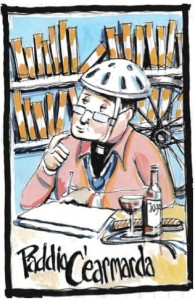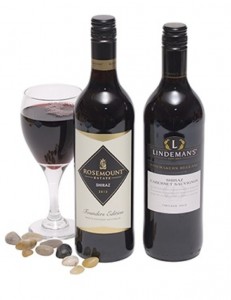What a delight it is for us to receive this installment from Paddy O’Caermeda, whom we are led to believe is champing at the bit to provide us with another illuminating take on the next federal election. Pity, if only we were in America, where electioneering is far from dull, typescripted and enervating. Paddy has got something to say about Cardinal Pell and Catholic Education. I Leave it with you to determine if he’s learnt, Rule 101# as a consequence of his education; the art of keeping a secret.
My Dad turns 90 in a month. In that long life he has seen so much change. Born in 1926 his early childhood was blighted by the depression. His father was the son of an Irish convict, transported for seven years in 1854 to Van Dieman’s Land for stealing two bottles of wine. He was Catholic, and he married my Grandmother, in the Anglican Church in Bairnsdale, probably because she was already expecting their first child, and she was from Ulster Presbyterian stock. He was a labourer who was too old to serve in the First World War, but careful enough to save and put a deposit on a failed Soldier Settlement Farm in the Boisdale Estate outside Maffra in Gippsland.
My Dad’s early education was in a one room school on the corner of his father’s block and later at Sale Tech. My Dad’s childhood was poor, not quite as dirt poor as my Mum’s. She was the thirteenth child in a family of fifteen, and her father was a tenant farmer on a dairy farm in Allansford. He was Church of Ireland, converted to Catholicism to marry my Catholic grandmother, who could remember the dirt floor of the tiny cottage at Port Fairy, once called Belfast, where she had grown up. He owned nothing of the farm, his labour and that of his children went to benefit the Presbyterian landlord. It was oppressed Ireland in miniature.
Rural poverty and religion are the real ancestors I can claim. My Dad’s father became terminally ill when Dad was only 13. His older sister had attended the Convent in Sale, a strange reversal of the deal his parents had done when they married, the boys would be Catholic and any girls would be Protestant. The Nuns, Irish of course, came each day in a little horse and buggy to help nurse my grandfather and slowly they cracked my grandmother’s flinty Presbyterian heart, convincing her to remarry as he lay dying, so he could be buried a Catholic. My Dad’s family lie in the cemetery in Heyfield. My grandmother is buried with her eldest son, daughter and son-in-law in the Anglican section, my grandfather with his mother in the Catholic section. After being together in life, to be redeemed it seems they had to buried apart.
Dad climbed out poverty through serving in the Air Force at the tail end of the Second World War. The policies of post-war reconstruction, which included free tertiary education, made the difference for him and for me, my brothers and sister. He went to Hawkesbury Agricultural College, trained in Dairy Technology, and found a job at the Allansford Butter Factory. He met my mother at the Palais de Danse in Warrnambool, where each Saturday night the band would play. She was beautiful, he was handsome. They fell in love, but to marry he had to become Catholic. Despite his Presbyterian uncles, all Masons, warning him that he was letting the side down, he did that, for love.
They were good Catholics. Attended Mass every week, ate fish on Friday, and from their meagre income made offerings each week in the collections and the planned giving (called Sacrificial giving). They were part of the generation that built the wealth of post-war Australia, and along the way from their pennies and shillings built the schools, churches, presbyteries and convents of the Catholic Church. We children were all baptised, and when the time came, sent to the local overcrowded Parish school in Cheltenham. The year I started, 1963, there were 75 children in my prep class with one very overworked teacher. My parents paid for me to have this dubious privilege, there was no state aid for Catholic schools, and they kept paying in the weekly offerings, the sacrificial giving and the school fees for me and my brothers to go to St Bede’s, and my sister to Kilbreda, the local Catholic High Schools, where despite all the disadvantages we got a good education. Because education was the only way that the hard climb from rural poverty was going to be secured and Catholic education was the only way to secure a place in heaven.
My parents, and their generation, were betrayed. I was never sexually abused and to my knowledge neither were my brothers or sister, and in the proper focus on the victims of abuse, we forget the thousands like my parents who gave their pennies and shillings to build the assets that the Church is so desperate to protect. It was the children of this generation who were raped and tortured by the clergy and it is the assets that this generation built that properly belong to victims as compensation, but the lawyers and the insurers don’t see it this way.
Tim Minchin’s brilliant and biting satire has focussed again on George Pell. I don’t know how culpable he is in this appalling story, and we may never know. What I do know is that his insensitive, brutal demeanour has become the public face of the Church that shits in the face of hard working people like my mum and dad, and treats victims of abuse at the hands of its clergy as lepers whose silence can be bought for a meagre bag of silver. He has earned his opprobrium, he deserves it. Not everyone agrees with me. I watched with amazement as Amanda Vanstone defended Pell describing him, perhaps infelicitously, as a whipping boy. Gerard Henderson was more predictable and his hagiographic claim that Pell was the first Prelate in Christendom to arrange for compensation for victims of abuse was appalling. Nothing said about how it was designed to limit the cost to the church, or buy the silence of victims, or lead in the warped logic of this terrible story to the destruction of John Ellis and the legal fiction of the Ellis defence.
But my greatest disappointment is Frank Brennan. I have known him nearly all my life. We joined the Jesuits in the same year, 1975, I was a tender seventeen year old, fresh from school, he was so much more worldly, having completed his Arts degree and half of his Law degree. To listen to Frank defend Pell, or suggest that Tim Minchin’s song somehow endangers the victims, or that it is impossible for the victims making their way to Rome to hear him give his testimony because the normal legal protections for Pell can’t be assured, drives me to distraction. Frank is a lawyer first and a priest second, he is playing the game of legal nicety forgetting that in the end it defends the indefensible and supports the strong over the weak. Pell has many supporters, the Catholics in Government might not be vocal, but their tacit support is palpable, the nods and winks to Christian organisations opposing reforms like equal marriage are part of the political climate that gives Pell and all he represents some comfort.
Far away from this in his retirement my old Dad still goes to Mass. Mum is too frail, but communion comes to her. Recently Dad attended a meeting at his Church on planned giving. He lives in a town popular with retirees so it was not surprising that many older parishioners were present. What was surprising was that none of the younger ones were there. The priest, a Vietnamese Australian, asked the primary school principal why. She told him that she had invited all parents by personal letters, and that in her view the Church had lost them and they weren’t coming back. Dad’s wry and in my view correct conclusion is that the Church is now full of nominal Catholics only interested in securing a cheap education for their kids. Perhaps this is why Pell and others are so keen to keep the assets that they have. Without the real estate, the tax exempt status and now generous State aid for the schools, there’d be no-one there.



